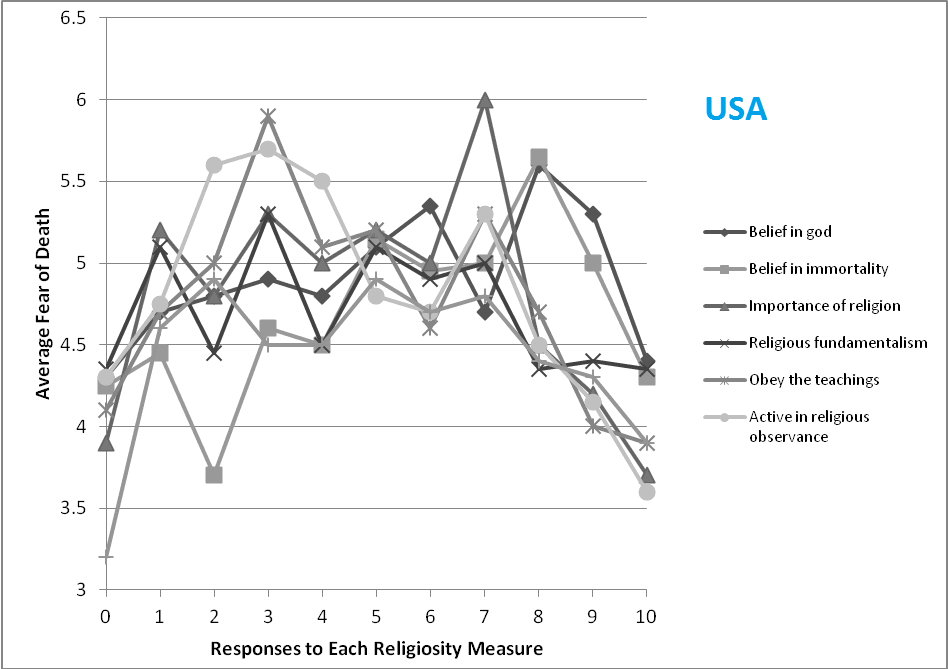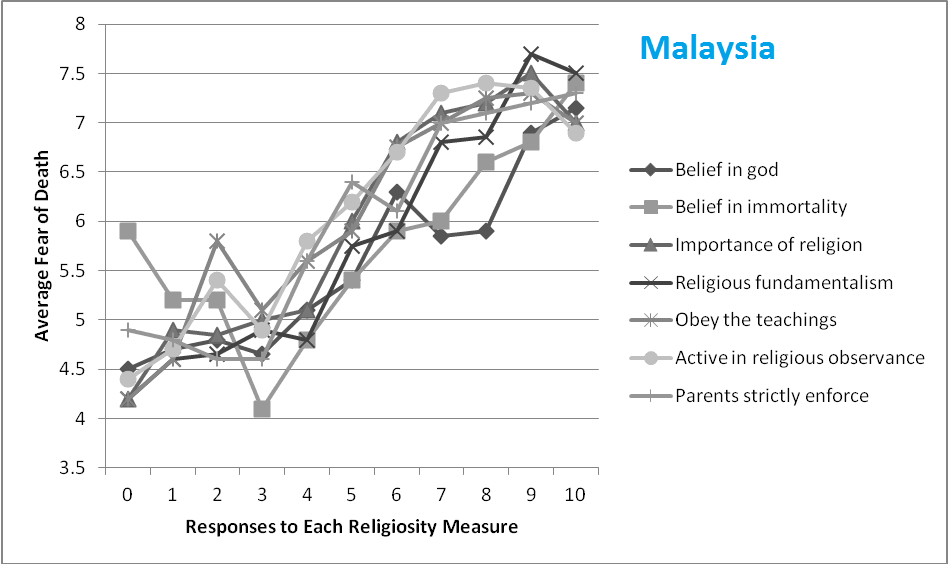Many people assume that religious people are less anxious about death than the non-religious. After all, the most popular religions (Islam and Christianity) explicitly hold out the promise of eternal rewards for the faithful.
However, it’s not quite that simple. After all, traditional versions of these gods are also pretty vengeful, and if you believe in a vengeful god, then you have to face the distinct possibility of some pretty nasty experiences after death. After all, even holy people usually have some guilty secrets.
 However, there’s very little international data on the relationship between religion and anxiety. A new study by Chris Ellis, along with colleagues at the University of Malaya, have gone some way to filling this hole, and the results are pretty intriguing.
However, there’s very little international data on the relationship between religion and anxiety. A new study by Chris Ellis, along with colleagues at the University of Malaya, have gone some way to filling this hole, and the results are pretty intriguing.
They interviewed nearly 5,000 people (mostly at Universities) in 3 countries: Malaysia, Turkey, and the USA.
The results for Malaysia were striking. There was a clear linear relationship between religiosity and fear of death. There was a similar relationship in Turkey, although less strong (they interviewed far fewer people in Turkey, however).
Even more striking were the results in the USA. Here, there was a curvilinear relationship – death anxiety was highest in those with average religious feelings.
The reason for these differences is probably down to differences in religious beliefs between Muslims and Christians. Muslims had the highest fear of death – the lowest fear of death was seen in the non-religious in America and Christians in Malaysia.
This tallies with an earlier study, which a few years ago reported that Muslims in the UK are more anxious about death than are Christians and people with no religion.
The authors explain their results in terms of a theory called “death apprehension”. This says that religion can have varying effects on death anxiety, depending on the actual beliefs held: belief in a demanding and vindictive God and the certainty about the reality of an afterlife can both lead to more anxiety. On the other hand, abiding by religious teachings and believing in divine forgiveness can reduce death anxiety.
Muslims seem to be more likely to believe in a vindictive god, and less likely to believe in a forgiving god. The authors put this down to fundamental differences in Islamic and Christian religions.
That’s possible, but I’m also inclined to think that Christianity has reinvented itself over the past 100 years. As social structures have evolved, the idea of god as a punisher has fallen out of fashion – indeed, many modern Christians don’t have any meaningful belief in Hell at all.
Whatever the cause of this difference, however, it’s likely that this explains the different relationship between religion and death anxiety in these nations.
There’s another interesting implication of the findings of this study, and that’s the observation that the non-religious have a very low fear of death. Other studies have also shown that the non-religious have a higher suicide rate. Could these two observations be linked?
![]() Ellis, L., Wahab, E., & Ratnasingan, M. (2012). Religiosity and fear of death: a three‐nation comparison Mental Health, Religion & Culture, 1-21 DOI: 10.1080/13674676.2011.652606
Ellis, L., Wahab, E., & Ratnasingan, M. (2012). Religiosity and fear of death: a three‐nation comparison Mental Health, Religion & Culture, 1-21 DOI: 10.1080/13674676.2011.652606
 This article by Tom Rees was first published on Epiphenom. It is licensed under Creative Commons.
This article by Tom Rees was first published on Epiphenom. It is licensed under Creative Commons.














